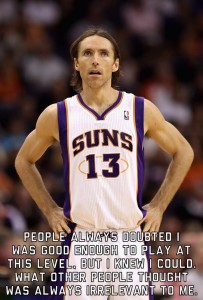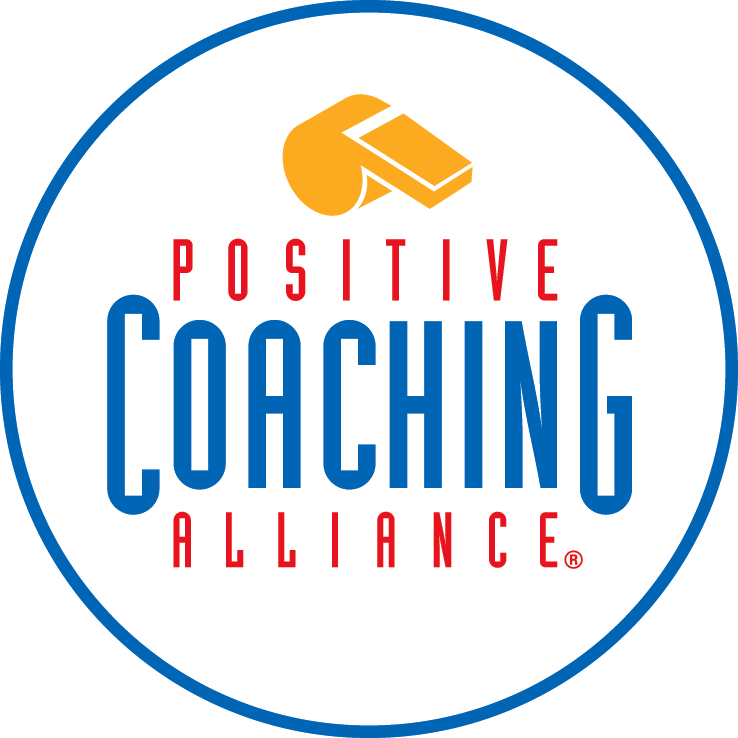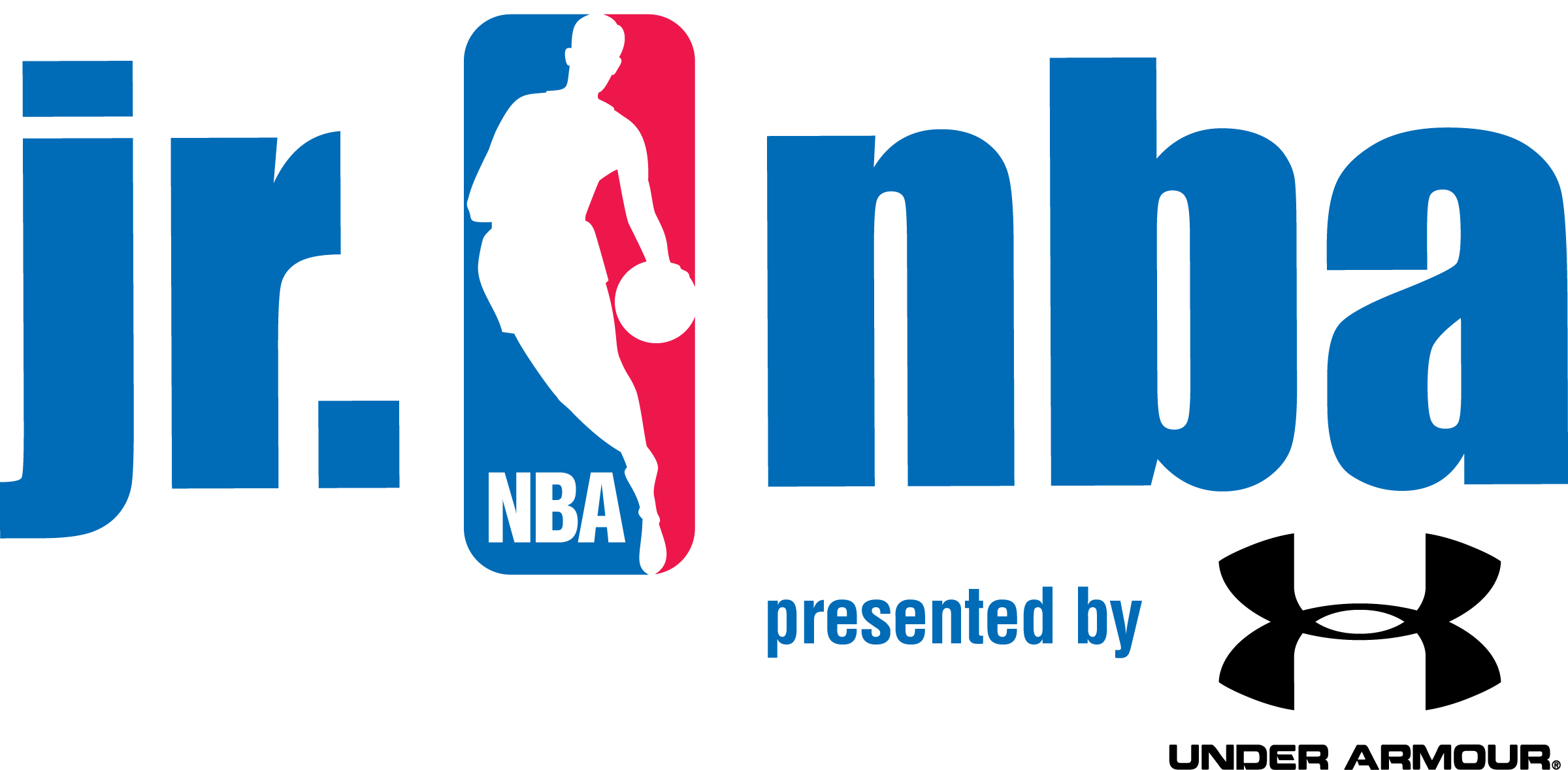
Basketball on the Edge – The Love of the Game
One of the themes that has consistently run through my blog posts here at Basketball on the Edge is the need to help your young player develop a love for the game. Without that love they’ll never practice or play enough to be great. Two recent events caused me to stop and think about my own experiences in the game of basketball, what the game has meant to me, and how the game drew me in and never let go. The first was a discussion I had with my son about Michael Jordan, why he retired, and why he came back. The second was the retirement of Steve Nash, a two-time NBA MVP. Nash wrote an essay titled “Life After Basketball” that reflected many of the thoughts I had when I stopped playing and continue to have as I get further away from my own playing career. I’ll share a few quotes from Nash’s essay and how they apply to developing a love for the game in young players. These two players loved the game and gave it everything they had. It was a choice to pour their passion into basketball. That is what you wish for your young player. That they love what they do (whether it is basketball or something else) and that it is their choice.
My conversation with my son about Michael Jordan centered on why he retired when he was still able to play and then why he came back, twice! My son’s first question was why Jordan retired from the Bulls the first time after having won three championships. I answered that he wanted to play baseball, was looking for a new challenge, or maybe was just burned out. No one really knows for sure. So my son said, “Why did he come back?” As I considered his question I tried to put my answer in terms that he could understand. Jordan loved the game I told him. There is nothing else in life that will ever replace the thrill of the competition and he was one of the fiercest competitors ever. Basketball players get to do what they do in front of fans, in Jordan’s case millions of fans. There is an adrenaline rush that can’t be replaced when you are no longer competing. Jordan loved to test himself against the best. He took pride in being the best basketball player on the planet. Even when he retired from the Wizards I would bet the house that he still felt he was the best player in the game. I never made it to the NBA I told my son, but I know why Jordan came back. You can never recoup the feeling you get from being part of a team, working toward a common goal, striving to get better, and then seeing it all pay off. I told my son that when I lay my head down on the pillow at night my dreams are still to this day about being a player. I’m sure Michael Jordan feels the same way. He doesn’t dream about owning the Hornets or sitting in business meetings, he dreams about winning championships as a player! That is the passion and love for the game that I hope I can pass on to my kids because basketball has given me some extraordinary opportunities.
How do you foster that love? When children are very young, third grade and below, the most important step is making sure they are having fun. Let them explore the game and give them opportunities to play in many different settings (on a team, in the driveway, on a nerf hoop, with their friends, etc.) For many kids shooting a basketball is an addictive experience. Give a kid a ball and they will immediately begin trying to throw it in the hoop. This is the first stage of loving the game. Steve Nash writes, “When I think of my career, I can’t help but think of the kid with his ball, falling in love. That’s still what I identify with and did so throughout my entire story.” A kid with a ball. That’s who I was too. Make the game fun so your young player falls in love.
When you’re a teenager with outsized dreams and a growing obsession, and someone tells you this ain’t gonna last forever, it’s scary. I never forgot it. – Steve Nash. I used to play pick-up basketball at the Omni Fitness Club, where the cardio machines were right outside the doors of the gym. I would look at the poor saps working out on a treadmill or elliptical machine and feel sorry for them. When I’m their age I thought, I’ll still be playing basketball to get my exercise. I thought the game would last forever. Then I got a job, got married, had kids, tore an acl, and suddenly I didn’t have as much time to play the game I loved. I still miss it. Help your young player appreciate and be thankful for the opportunity to play the game. It doesn’t last forever, despite what we think when we are young.
I looked at my hero, Isiah Thomas, and thought to myself, “OK, I’m nowhere near the player he is but if I get better every day for 5 or 10 years, why can’t I be as good as him?” – Steve Nash. What better way to think about loving the game than planning to get better each day. I kept a journal to help me keep track of my improvement. Why can’t I do it? Why can’t your young player do it? Maybe they can. It starts with a love of the game.
This ever-present pursuit — has made me who I am, taught me and tested me, and given me a mission that feels irreplaceable. – Steve Nash. The game shaped Nash into who he is today. I feel the same way. The game challenged me to get better, it helped develop my work ethic, it taught me the value of sacrifice, it kept me out of trouble, it gave me a mission. The game continues to do that, but in a different way. My experiences in basketball and the people I’ve met through those experiences have been invaluable to my development as a person. My mission now is to help mold the next generation of players and help the youth basketball community provide a better environment for kids to love the game.
My dad was an athlete who played semi-pro soccer. In the backyard or after games as a kid, he always applauded creative play. He always appreciated the unselfish. He never said, “Wow, three goals!” Instead he said, “Brilliant vision to see your teammate coming in behind the play,” or, “So unselfish to pass when you could’ve shot. That makes me proud.” I know that’s not normal and I’m grateful. – Steve Nash. Teach your young player that there’s more to the game than just scoring. I used to get frustrated when I was a young player because I would pass the ball and my teammates couldn’t catch it. The best advice my Dad ever gave me in the game of basketball was “Keep passing the ball, someday you’ll play with teammates that can catch it.” I never forgot that and when I got to high school it was finally true. If a player loves to pass and has a complete game, they’re much more fun to play with and coaches love all-around players. Encourage the development of all the skills. Ask about your young player’s “floor game” after they play, not just how many points they scored. Send the right messages and your young player will remember them forever.
My junior high coaches, Lanny and Sheff, saw this ball of energy and passion for the game in me, and went way out of their way to foster that passion while reining me in a little. They started something. – Steve Nash. If you are a coach, I hope this hits home. You may not realize the power you have to create an environment that fosters a love for the game or kills it off before a young player can even get started!
My Santa Clara coach, Dick Davey, pushed me so hard only because he thought I had it in me. He made me mentally strong. That toughness allowed me to keep overcoming and taught me to never give in. – Steve Nash. Great players loved to be coached. They love to be pushed. Help your young player develop this mentality. Help them look at criticism as a way to improve, not a personal attack or reason to make excuses. Players who love the game are mentally tough.
When people ask me if I have a favorite game or play or moment on the court that stands out the most, I can’t answer them. It all blends into one. What comes to mind are all the great teammates I’ve played with and the friends I’ve made through the years. – Steve Nash. The game can give you so much. I can totally relate to Nash’s quote. Friends, family, and former teammates I talk to often remember more details about specific games or plays. Of course, I remember a few, but what I mostly remember are the people. My coaches, my teammates, my opponents, our team managers, the people are what matters. A love for the game allowed me to meet so many great people. A love for the game opens doors to so many opportunities in life. Take advantage!
I will likely never play basketball again. It’s bittersweet. I already miss the game deeply, but I’m also really excited to learn to do something else. – Steve Nash. I relate to that on a level that many people probably will never understand. When you love the game, nothing ever replaces it. Yet, at the same time the world is a huge place. There is so much to see and do. I find there isn’t enough time in the day to learn and experience everything life has to offer. I do know that my life would be poorer for not having had an undying love for the game. I’ll bet Steve Nash feels the same way as he begins to explore the world beyond basketball.
Below is a link to the entire essay from Steve Nash. If you read it I think you’ll feel his love for the game come through. If your young player develops that love for the game they’ll be on their way to getting the most out of their basketball experience regardless of what level of basketball they reach.
Click here to read “Life After Basketball” by Steve Nash
Leave us a comment about this post headstartbasketball@usa.net



